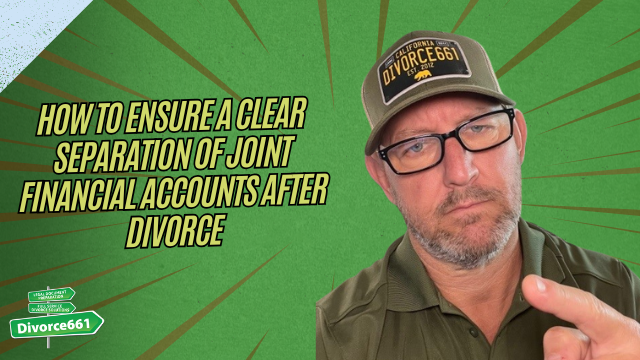How to Protect Your Credit While Separating Joint Finances?
Divorce is already a challenging life transition, but it can also bring unexpected financial risks—especially when it comes to your credit score. I’m Tim Blankenship from Divorce661, and I want to share some crucial insights on how joint accounts can impact your financial future even after a divorce is finalized. Understanding these hidden risks is the first step toward safeguarding your credit and moving forward confidently.
Why Joint Accounts Still Affect You After Divorce
Many people don’t realize that even after the divorce papers are signed, joint accounts remain legally linked to both parties. This means if your ex misses a payment on a shared credit card, loan, or utility account, your credit score could take a serious hit. Imagine losing over 100 points on your credit score because of missed payments that weren’t your fault. This isn’t just hypothetical—it happened to a client of ours, highlighting the importance of taking proactive steps during divorce to separate finances cleanly.
Step 1: Identify All Joint Accounts
The first and most important step is to create a comprehensive list of every joint account you share with your ex. This includes:
- Credit cards
- Loans (auto, personal, mortgage)
- Utilities and service accounts
- Any other shared financial obligations
Knowing exactly what you’re dealing with is half the battle. This list becomes your roadmap to financial security and helps you pinpoint where risks lie.
Step 2: Close or Separate Joint Accounts
Wherever possible, close joint accounts or refinance loans so they are in one person’s name only. This financial separation is vital because it helps prevent future liabilities from falling on your shoulders. For example, refinancing a mortgage solely under one name removes the risk of missed payments affecting the other person’s credit.
Closing joint credit cards or utility accounts also makes it clear who is responsible going forward. It’s a proactive measure that can save you from future headaches and credit damage.
A Real Client Story: The Cost of Inaction
“Her ex missed two credit card payments. Even though the court made him responsible, her credit dropped over 100 points. We helped her close the remaining accounts—but the damage was already done.”
This story is a hard lesson in why timely action is necessary. Waiting too long to separate finances can cause significant damage to your credit that’s difficult to repair.
How Divorce661 Can Help You Protect Your Credit
At Divorce661, we specialize in reviewing every joint account during the divorce process to ensure a clean financial break. Our goal is to:
- Identify all joint financial responsibilities
- Help you close or refinance accounts properly
- Create a judgment that protects your credit long after the divorce is finalized
By structuring your divorce judgment with credit protection in mind, we offer peace of mind and help you secure your financial future.
Take Control of Your Financial Future Today
Your credit score is an essential part of your financial health, especially during and after a divorce. Don’t let joint accounts become a hidden liability that drags your score down. Start by listing all your joint accounts, then work on closing or refinancing them as soon as possible.
If you’re ready to take control and protect your credit, visit Divorce661.com for a free consultation. Let’s work together to secure your financial future and move forward with confidence.
Share Your Experience
Have you been burned by joint debt during a divorce? Your story can help others avoid the same pitfalls. Feel free to share your experience in the comments or reach out for guidance.










